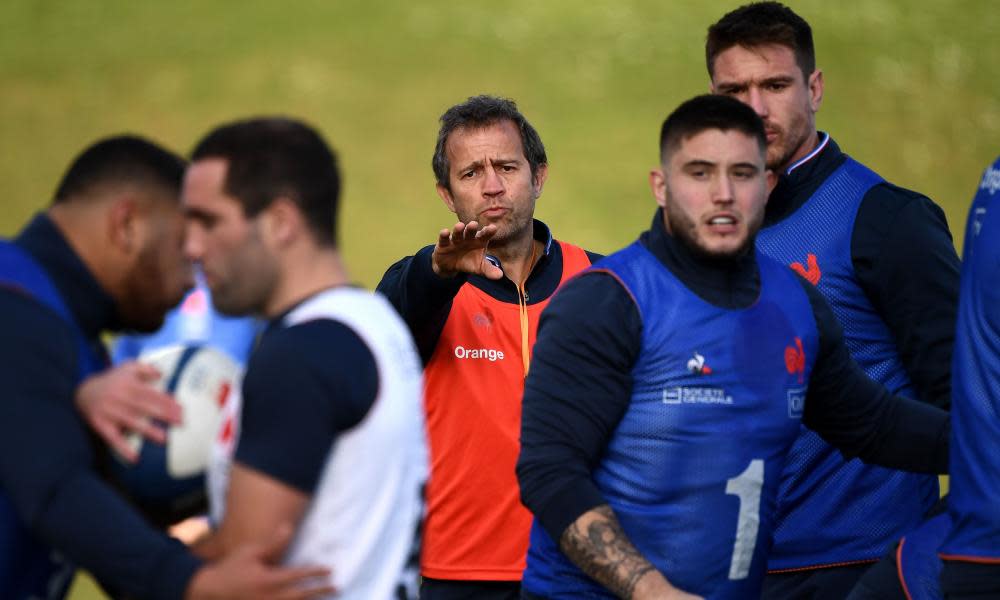Fabien Galthié will get time to revive France and time is on his side

The French revolution this week moves beyond the skirmish stage. Home victories over England and Italy put Les Bleus on top of the Six Nations 10 years after they last finished a campaign in that position, but the test is whether they have found a cure for their travel problems.
France’s decline in the 2010s was stark. When they won the grand slam in 2010, their record in the 11 seasons of the Six Nations was 41 victories and 14 defeats. In the nine campaigns since then, they have lost three more matches than they have won and their only away victories since defeating Scotland in 2014 have come in Rome.
They last won in Cardiff in the tournament, their destination this weekend, in 2010. It was their 11th away victory in 14 matches against Wales, but they have lost the last four and their capacity to overplay and make mistakes made them vulnerable against a team coached by Warren Gatland who used defence as the means of attack.
Related: France’s Fabien Galthié uses Boks as blueprint to beat England
Both teams are under new management. Fabien Galthié is in charge of France, a decision that the French Rugby Federation president Bernard Laporte did not particularly want to make. The pair have history with Galthié regarded as a maverick who does not feel bound to the collective but Laporte’s desire to be able to appoint an overseas coach was thwarted by the clubs who voted against him on the question.
Laporte, France’s head coach in 2002 and 2004 when they won the grand slam, is in a hurry to salvage the national side’s reputation. They are the World Cup hosts in 2023 and he is in line to be voted World Rugby’s vice-chairman later this year. His first task on becoming president was to bring under control France’s leading clubs who had no time for the concept of the primacy of international rugby.
France’s Top 14 was awash with players who were not qualified to play for Les Bleus, the last outpost of the foreign legion. He introduced home grown incentives, copying England, and no longer do the national squad return to their clubs on fallow weekends. The game there is becoming more joined up, allowing Galthié and his coaching team to better harness the natural talent in the country.
Galthié remarked at the launch of the Six Nations that the French public had fallen out of love with the national side having been treated for too long to blundering mediocrity. The club game has never been more popular with regular attendances comfortably exceeding those in the Premiership and while the Rugby Football Union this month has effectively called time on the Championship as a means of access to the top flight, a shocking admission of failure given the playing population in England, France are introducing a fully professional third division.
The RFU is paying for handing over control of running the Premiership to the clubs who wasted no time in forming a cartel. Teams who win promotion from the Pro D2 in France receive equal funding with the 12 they join, something denied to London Welsh on their two campaigns in the Premiership when, as a non-shareholder, they were put at a considerable financial disadvantage and went straight back down.

The strength of the game in France is in the south which is why for the past three seasons one place in the second division has been reserved for a club which does not get there on merit but is promoted according to location. It must be based in the north of the country, have a long-term development plan and be in an area that can sustain a professional club. As England contract, France expand.
But it is England who are the greater international force and Laporte will be judged on the impact made by Les Bleus. The performances against England and Italy were both a mark of what had gone before, moments of brilliance pockmarked by lapses in concentration, but there has been a change in attitude.
Related: Bono drops in to help give Andy Farrell's Ireland the edge against England
As there had to be with Shaun Edwards in charge of the defence, not someone who takes non for an answer. He was in Paris last year when Wales overcame a 16-point interval deficit to win, handed a way back by poor mistakes. France like to play and push boundaries, but it is in the moments when they need to pause for breath and not offer their opponents a way in that they are vulnerable.
When Laporte was in charge, England were his model: disciplined and organised. He viewed the French way of flair and flare-ups as leading to inconsistency, but his experiment exploded in the 2007 World Cup semi-final in Paris when they tried to play like England and lost to the real thing.
It is a question of balance and at least Gatland will not be there in Cardiff. Wales are also trying to move on, using their own possession to attack rather than squeeze errors out of their opponents. The last four matches between the sides have been close, France by two in 2017 and Wales by one and five since then and a point in last year’s World Cup quarter-final.
Galthié will not be judged on this season. France have been sustained by individual brilliance with their set-pieces yet to function, but they are a young side. Only three of the 23 who were involved against Italy in the last round played in Cardiff two years ago. Saturday will say more about where they are than the first two rounds, but they come armed with a plan rather than a whim.
• This is an extract from our weekly rugby union email, the Breakdown. To subscribe, just visit this page and follow the instructions.


